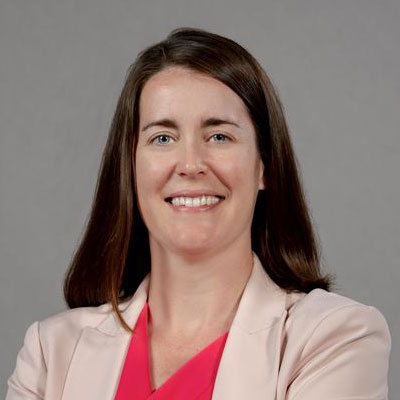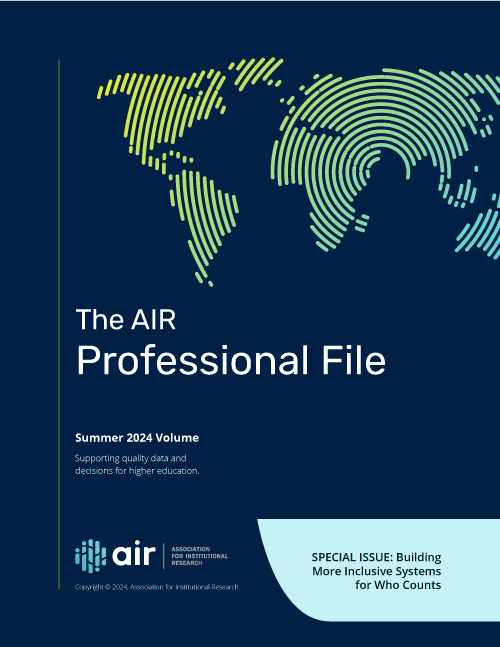Three Questions with Dr. Elizabeth Jach, AIR Professional File Guest Editor
We caught up with Dr. Elizabeth Jach, guest editor of Building More Inclusive Systems for Who Counts, Special Issue of the AIR Professional File, Summer 2024, to learn more about the issue, how it came to be, and what lies within.
eAIR: What inspired you to take on the role of guest editor for this special issue, and what are the key goals you hoped to achieve with this collection of articles?
Jach: My mentor and friend, Dr. Becki Elkins, connected me with the opportunity to pitch a topic for guest editing the AIR Professional File. As a scholar practitioner, I had experience as an author and a reviewer, but I had not previously served as an editor. My experience has made me well-versed in the power and limitations of both data collection and existing data—which illuminate the need for building more inclusive systems for who counts. As I state in the introduction to the special issue, “My aspiration for this volume is to keep building on what is being done already and what we can keep doing better.”
eAIR: The articles in this issue focus on groups that are often underrepresented in institutional data, such as undocumented students and Indigenous populations. Why is it important to spotlight these groups?
Jach: Emphasizing Indigenous students and undocumented students is critical because too often these groups get overlooked and/or aggregated into other groups. Representing identity in an inclusive manner requires the tenets of data feminism feminism, such as taking the time to collaborate with members of constituent groups as well as across units. The articles in this volume also nuance and unpack other categories—such as two or more races within race/ethnicity, non-binary within gender, disability, and various ways to define first-generation. Too often institutional research offices do not have sufficient funding or staffing to take on beyond what is required by federal, state, and/or accreditor reporting requirements. The articles in this special volume provide clear guidance on how to do better for populations who are too often overlooked within higher education.
eAIR: You mention that many current institutional research systems conflate sex and gender or render certain populations invisible. What are some practical steps institutions can take to address these oversights?
Jach: Many of the articles specify recommendations with guidance for action. In brief, collaboration, centralizing initiatives, and investment of time and resources are key. To be sure, many institutional research offices are already well-integrated into their campus and a key stakeholder in campus-wide initiatives, making them well-suited to work toward building more inclusive systems for who counts.
I encourage individuals to read the articles as the authors have put together tremendous guidance. In the table below, I highlight a key summary, table, and/or appendix from each article to pinpoint specific examples for how to engage in this work.
| Resource | Page | Author(s) |
|---|---|---|
| Working with Indigenous Data: “Implications for Organizational Consideration” | p. 15 | Lopez et al. |
| “Framework for Race Data Disaggregation Readiness” | p. 34-37 | Lieng et al. |
| Table: “Guiding Questions to Disrupt Quantitative Monoracism in Institutional Research” | p. 51 | Wong-Campbell et al. |
| Accounting for Undocumented Students - “Recommendations for Reflection and Practice” | pp. 88-89 | Carvajal et al. |
| Appendix: “Chosen Name Update Form” | p. 113 | Gogno et al. |
| “Good Practices in the Collection of Data on the Nonbinary Sex” | p. 130 | Berrios et al. |
| Appendix: “Starting Points for Disability-Related Access, Equity, and Inclusion for Research” | p. 156 | Clarke & Lalor |
| “Defining First-Generation Students in Postsecondary Education” | p. 164 | Drake |
 Elizabeth A. Jach, PhD, is Associate for University Planning and Analysis, Office of Institutional Research and Data Analytics, State University of New York, System Administration. Contact her at elizabeth.jach@suny.edu
Elizabeth A. Jach, PhD, is Associate for University Planning and Analysis, Office of Institutional Research and Data Analytics, State University of New York, System Administration. Contact her at elizabeth.jach@suny.edu

